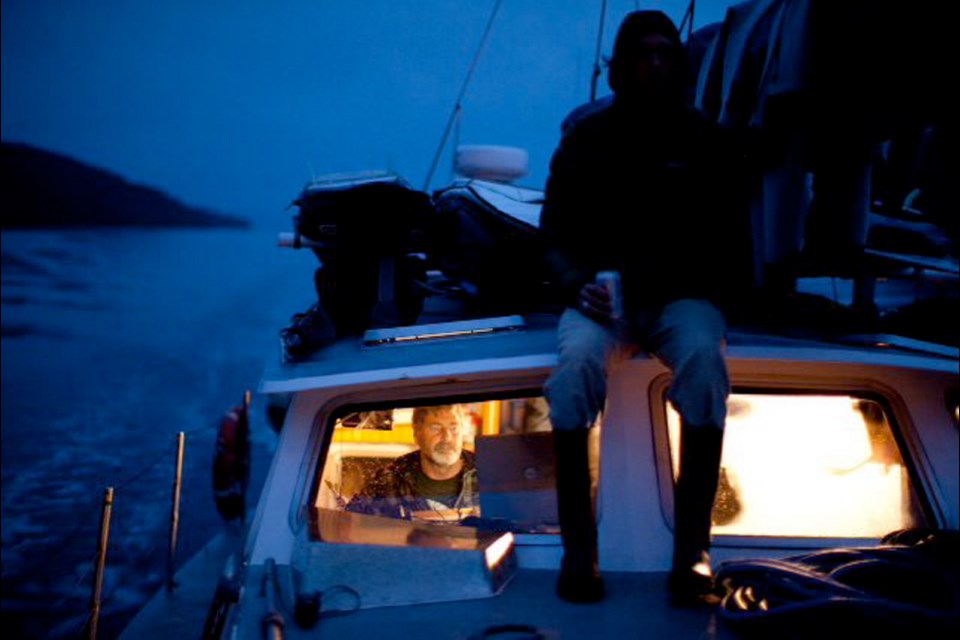British Columbia’s ancient Great Bear Rainforest is nothing short of breathtaking — granite monoliths encompass carpets of hanging moss, stunning fjords and rivers full of jumping salmon.
The variety of wildlife in the region — bears, cougars, wolves, whales and the unique Kermode, or “spirit bear” — is equally impressive, but the animals face serious, deadly threats.
Protection Island resident Brian Falconer is on B.C.’s central coast protecting animals from a gruesome fate as the fall season of the grizzly trophy hunt continues.
Every year since 2005, Falconer, a marine operations co-ordinator with B.C.’s Raincoast Conservation Foundation, sails the organization’s research vessel “the Achiever” from Protection Island to the Great Bear Rainforest.
He spends months researching wildlife and watching for hunters with a team of up to a dozen, who arrive each spring and leave in late October.
“We do a lot of different research and we work with the biological station in Nanaimo a lot,” he said. “We’ve been doing a project the past three years on fin whales. We do a lot of work with marine mammals.”
Falconer said Raincoast reports trophy hunters and wants to ban the trophy hunt, but has never opposed hunting in general.
He feels a hunter shooting a deer and filling their freezer with meat is different than completely needless killing.
“(Trophy hunters) cut the paws off, they cut the head off and they skin it, so what’s left behind is the entire bear, the meat and the guts,” he said. “They take the hide and they mount it as if it was a fierce bear that was attacking them but in reality they just snuck up and shot it in the back.”
Falconer said 200 to 300 grizzlies are killed by trophy hunters every hunting season in the spring and fall, when provincial regulations permit hunters to go after bears waking from hibernation or feeding by streams.
He said the number of grizzlies in the province hasn’t been properly documented, but current numbers estimate up to 17,000.
Aside from reporting hunters and researching wildlife, Falconer has hosted media coming to film in the area and he will take a group of guests from outside of B.C. into remote places in the Great Bear Rainforest next week.
Raincoast has spent millions to own the rights to more than 28,000 square kilometres of commercial hunting territory and needs to bring “hunters” into the territory as a provision of its commercial guiding licence, but the guests will only shoot wildlife with cameras.
Raincoast partners with four First Nations in the area and Falconer said trophy hunters are violating tribal laws against the sport introduced last September.
“Whether (trophy hunting) is legal or illegal under the Provincial Wildlife Act it certainly is against tribal laws,” he said. “Constitutionally they have been given the right to manage the resources and their territory.”
Falconer said signs have been put up, reading “trophy hunting closed, please respect our traditional law,” but trophy hunters ignore them.
The controversial grizzly trophy hunt was recently in the spotlight when it was revealed NHL hockey player Clayton Stoner, a Port McNeill-born defenceman for the Minnesota Wild, shot a bear in May.
Stoner issued a statement saying he had grown up hunting in B.C. and had applied for and received a grizzly-hunting licence through a B.C. limited-entry lottery.
Raincoast recently asked the B.C. Ministry of Forests, Lands and Natural Resource Operations to investigate the incident, calling it “implausible” that Stoner legally killed the bear.
“I don’t believe that was a legal hunt. The hunting tags are only available to residents of B.C.,” Falconer said.
“I recently spent time with another hockey player in the NHL who plays with another team in the U.S. He couldn’t vote in B.C. because he wasn’t a B.C. resident despite the fact that he was born and raised (in the province).”
Falconer said trophy hunting is “ridiculous” and compares it to “coming up to someone at home, breaking into their front door and shooting them at the dinner table.”
“In almost any other parallel you would never be able to justify it,” he said.



